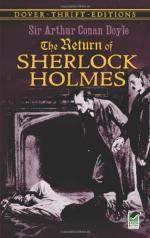“So I read it.”
“Surely there is another alternative, Mr. Holmes. I don’t know whether you observed my bedroom window?”
“Lattice-paned, lead framework, three separate windows, one swinging on hinge, and large enough to admit a man.”
“Exactly. And it looks out on an angle of the courtyard so as to be partly invisible. The man might have effected his entrance there, left traces as he passed through the bedroom, and finally, finding the door open, have escaped that way.”
Holmes shook his head impatiently.
“Let us be practical,” said he. “I understand you to say that there are three students who use this stair, and are in the habit of passing your door?”
“Yes, there are.”
“And they are all in for this examination?”
“Yes.”
“Have you any reason to suspect any one of them more than the others?”
Soames hesitated.
“It is a very delicate question,” said he. “One hardly likes to throw suspicion where there are no proofs.”
“Let us hear the suspicions. I will look after the proofs.”
“I will tell you, then, in a few words the character of the three men who inhabit these rooms. The lower of the three is Gilchrist, a fine scholar and athlete, plays in the Rugby team and the cricket team for the college, and got his Blue for the hurdles and the long jump. He is a fine, manly fellow. His father was the notorious Sir Jabez Gilchrist, who ruined himself on the turf. My scholar has been left very poor, but he is hard-working and industrious. He will do well.
“The second floor is inhabited by Daulat Ras, the Indian. He is a quiet, inscrutable fellow; as most of those Indians are. He is well up in his work, though his Greek is his weak subject. He is steady and methodical.
“The top floor belongs to Miles McLaren. He is a brilliant fellow when he chooses to work—one of the brightest intellects of the university; but he is wayward, dissipated, and unprincipled. He was nearly expelled over a card scandal in his first year. He has been idling all this term, and he must look forward with dread to the examination.”
“Then it is he whom you suspect?”
“I dare not go so far as that. But, of the three, he is perhaps the least unlikely.”
“Exactly. Now, Mr. Soames, let us have a look at your servant, Bannister.”
He was a little, white-faced, clean-shaven, grizzly-haired fellow of fifty. He was still suffering from this sudden disturbance of the quiet routine of his life. His plump face was twitching with his nervousness, and his fingers could not keep still.
“We are investigating this unhappy business, Bannister,” said his master.
“Yes, sir.”
“I understand,” said Holmes, “that you left your key in the door?”
“Yes, sir.”
“Was it not very extraordinary that you should do this on the very day when there were these papers inside?”




